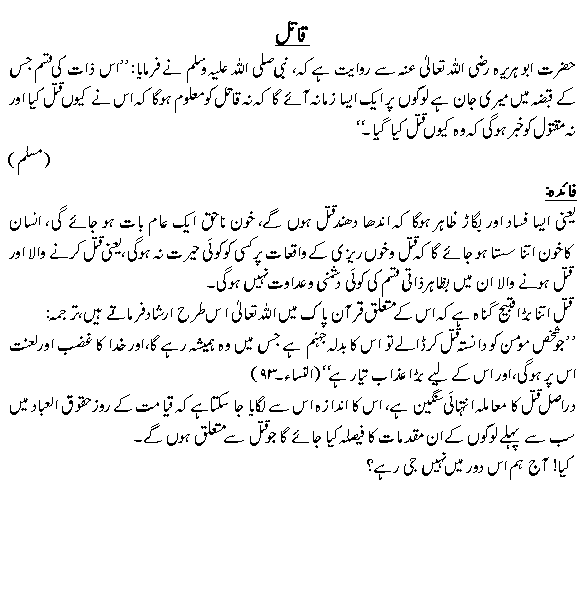
Qatil Aur Maqtool
AL-MUTA’ALEE – The All-Exalted
High exalted be Allah, the King, the Real! Do not rush ahead with the Qur’an before its revelation to you is complete, and say: “My Lord, increase me in knowledge.” (Surah Ta Ha, 20:114)
Some people, despite the countless signs surrounding them, fail to appreciate Allah’s greatness. Despite their helplessness, they become arrogant and fail to consider their Creator, as they follow the urgings of their lower self, which encourages them to indulge in evil. Yet the faithful, aware of their helplessness before Allah’s greatness, understand that they have no real power whatsoever. Allah calls attention to creation’s helplessness and His greatness in the following example:
O mankind! An example has been made, so listen carefully. Those whom you call upon besides Allah cannot even create a single fly, even if they were to join together to do it. And if a fly steals something from them, they cannot get it back. How feeble are both the seeker and the sought! They do not measure Allah with His true measure. Allah is All-Strong, Almighty. ( Surat al-Hajj, 22:73-74)
Even though every corner of the universe manifests Allah’s greatness, this vast manifestation is not sufficient to explain His infinite power and greatness. Allah is exalted above any partnership, defects, and limits. He is the sole Owner of all beautiful names and superior attributes. His knowledge, wisdom, might, power, mercy, compassion, and generosity are infinite.
The word “infinite” is a concept over which one has to think a lot in order to grasp Allah’s greatness. After death, Allah will create people anew and make them start a new life either in Paradise or in Hell as a repayment for what they did in this world. Here, we are talking about infinity – not about a hundred years, a hundred thousand years, millions, or even billions of years. That is, even if there were hundreds of trillions of people destined to live for a trillion years, they still would be unable to determine the exact limit of infinity.
However, Allah has such vast knowledge that everything we consider “infinite” is within His knowledge. From the moment that time was created until eternity, Allah determines every event, thought, and moment of time, as the Qur’an proclaims:
We have created all things in due measure. Our command is only one word, like the blinking of an eye. We destroyed those of your kind in the past. But is there any rememberer there? Everything they did is in the Books. Everything is recorded, large or small. ( Surat al-Qamar, 54:49-53)
Then when He granted them a healthy, upright child, they associated what He had given them with Him. But Allah is far above what they associate with Him! ( Surat al-A‘raf, 7:190)
He Who guides you in the darkness of land and sea and sends out the winds bringing advance news of His mercy. Is there another deity besides Allah? May Allah be exalted above what they associate with Him! ( Surat an-Naml, 27:63)
Allah created you, then provides for you, then will cause you to die, and then will bring you back to life. Can any of your partner-deities do any of that? Glory be to Him, and may He be exalted above anything they associate with Him! ( Surat ar-Rum, 30:40)
He who calls others to follow the Right Guidance …
Abu Hurairah (May Allah be pleased with him) reported: The Messenger of Allah (sallallaahu ’alayhi wa sallam) said,
“He who calls others to follow the Right Guidance will have a reward equal to the reward of those who follow him, without their reward being diminished in any respect on that account.” [Muslim]
Commentary: This Hadith has glad tidings for those who learn the knowledge of religion, teach it, and impart it to others.
Ref.: Imam Al-Nawawi’s Riyad-us-Saliheen # 1382.
Allah Ta’ala Aur Insan Ka Taluqat Bazriya Quran Majeed
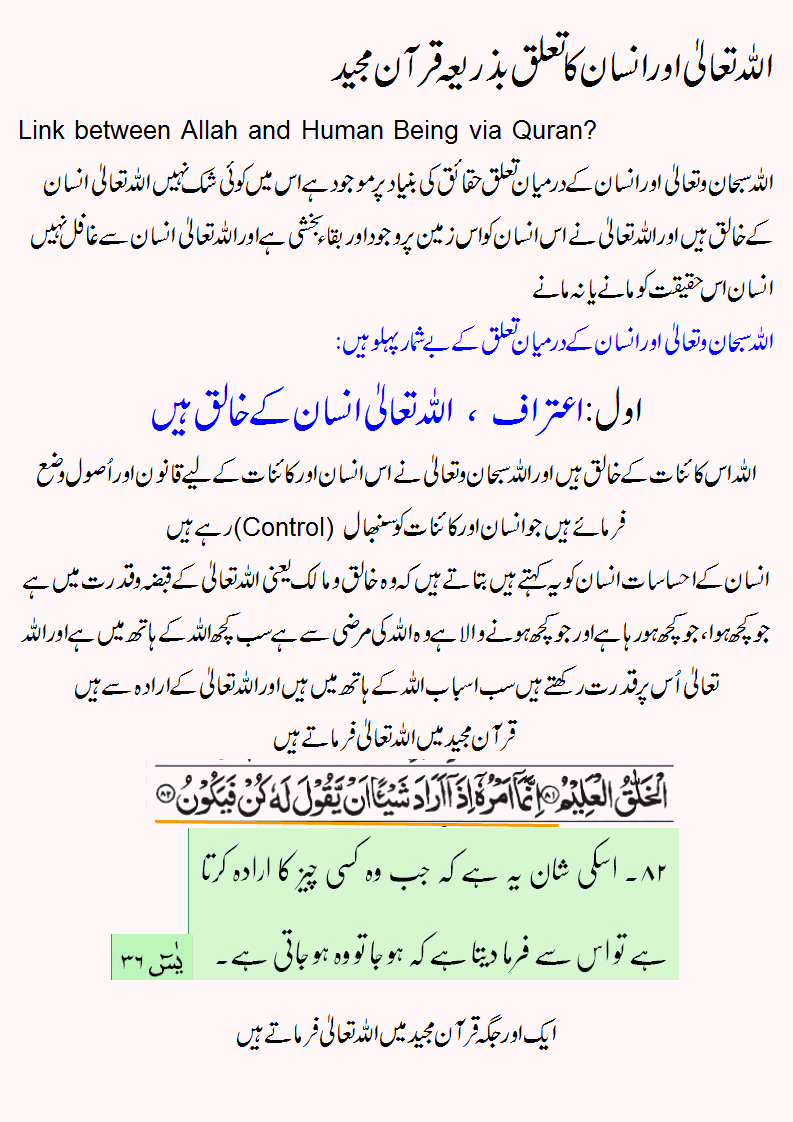
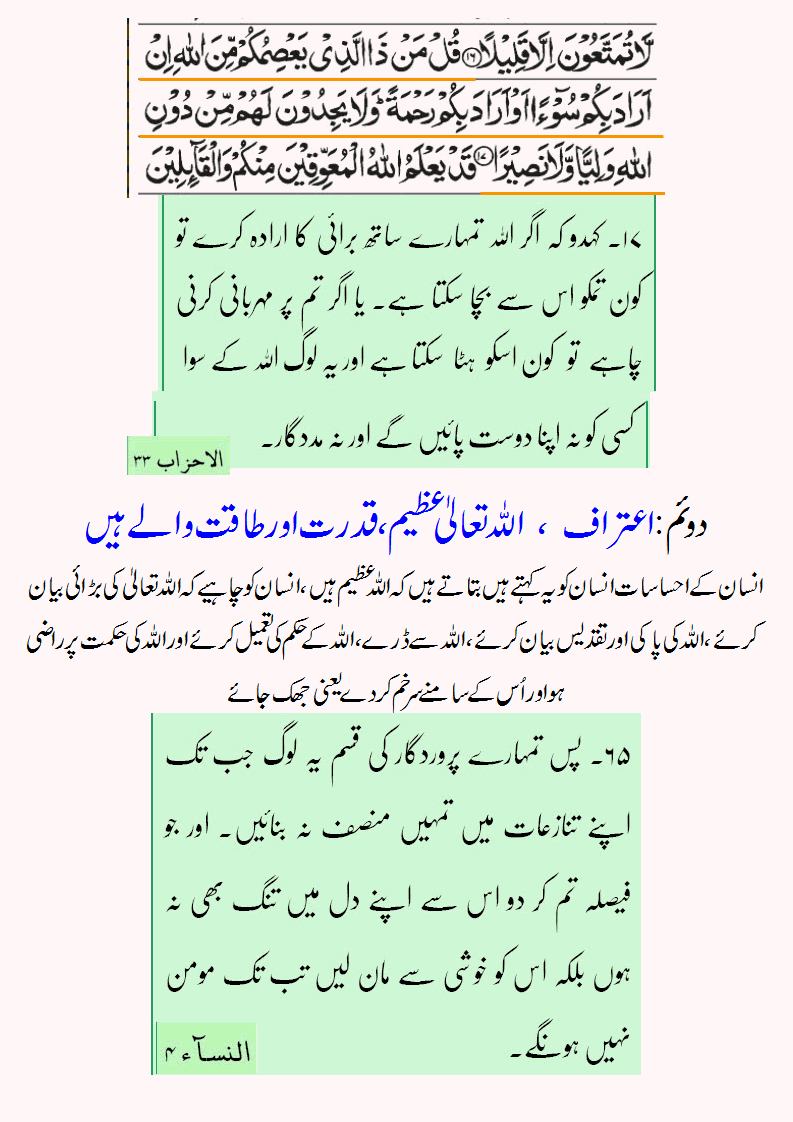
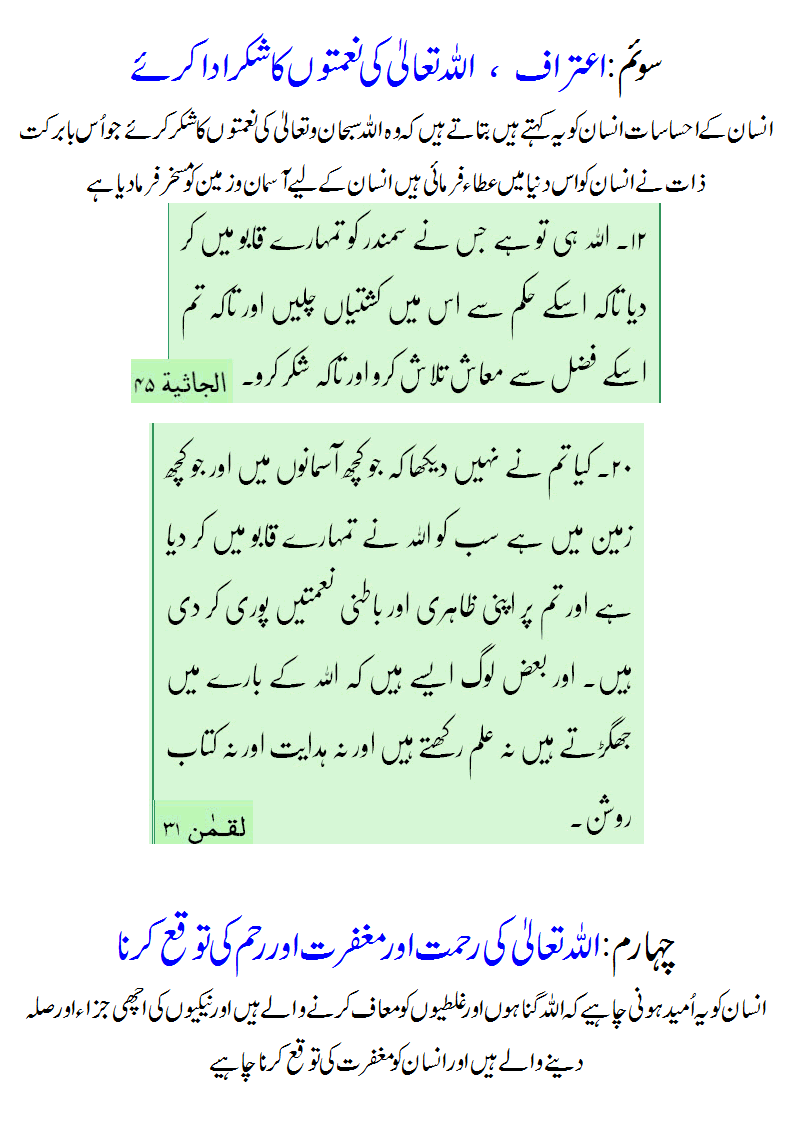
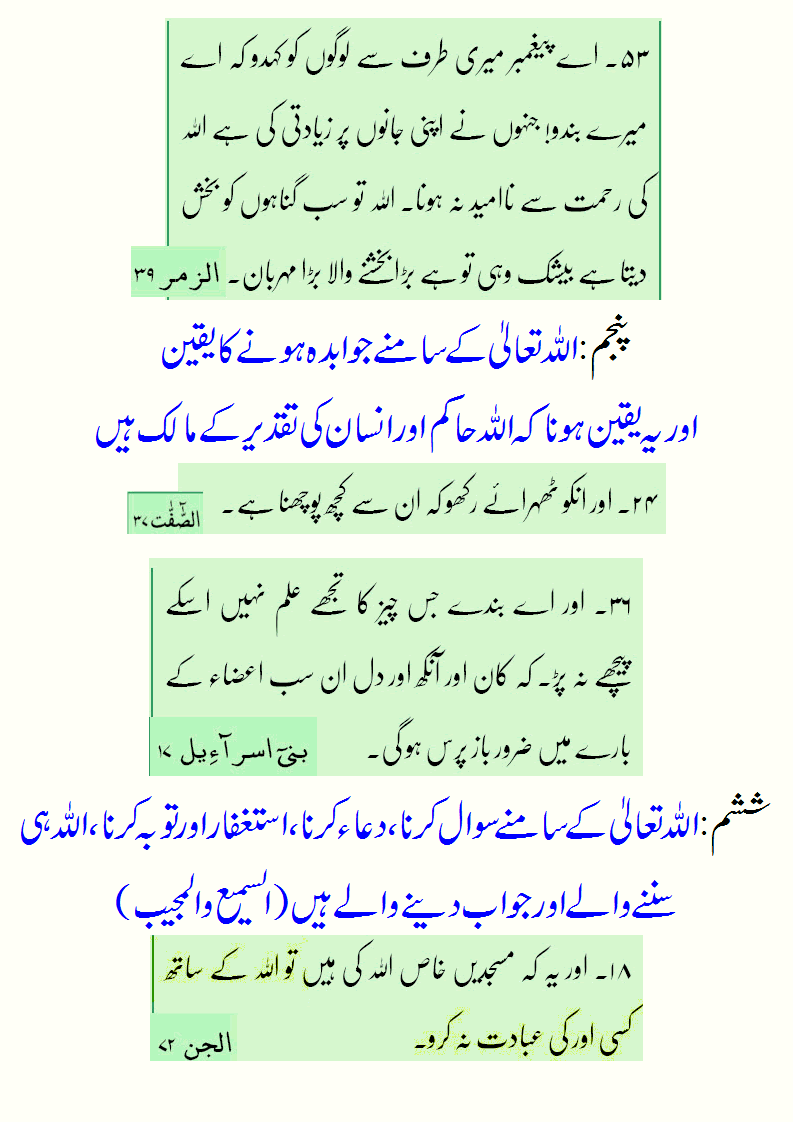
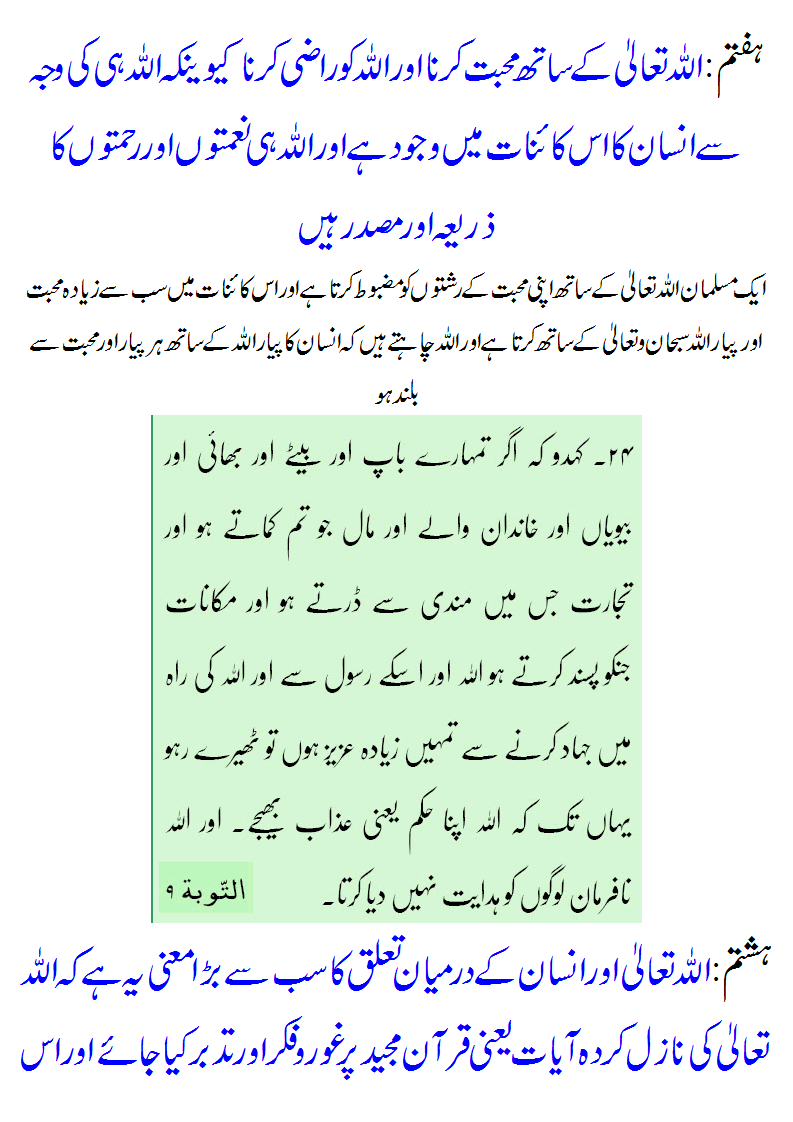
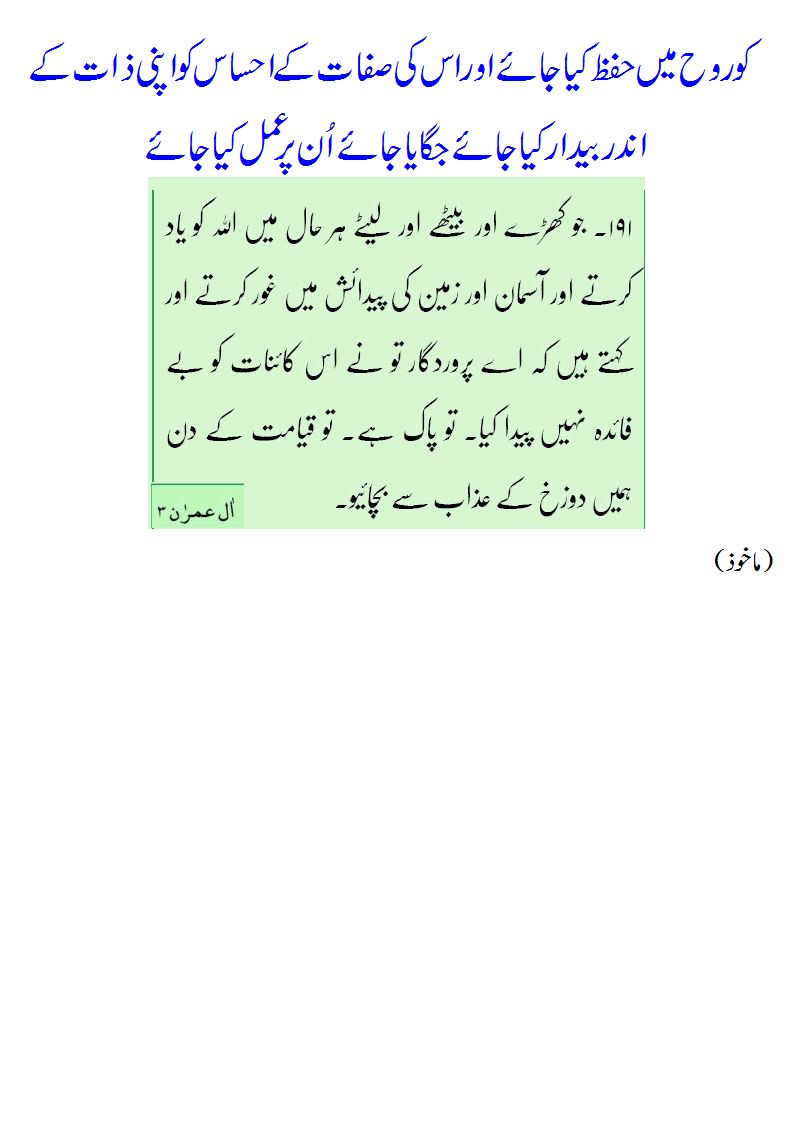
Allah Ta’ala Aur Insan Ka Taluqat Bazriya Quran Majeed. Link Between Allah and Human Via Quran.
Allah Respites Men Till An Appointed Time
[20. Surah Sura Ta-Ha : Ayah 132] And enjoin prayer on your followers, and steadily adhere to it; We do not ask you for subsistence; We do give you subsistence, and the (good) end is for guarding (against evil).
Allah Respites Men till an Appointed Time
[16. Surah An-Nahl : Ayah 61] “And if Allah had destroyed men for their iniquity, He would not leave on the earth a single creature, but He respites them till an appointed time; so when their doom will come they shall not be able to delay (it) an hour nor can they bring (it) on (before its time).”
The Merits of Forgiveness and Humility
[Sahih Muslim: Book 32 ‘Kitab Al-Birr was-Salat-I-wa’l-Adab’, Number 6264] Abu Huraira (Radi Allah Anhu) reported Allah’s Messenger (sal-allahu-alleihi-wasallam) as saying: Charity does not in any way decrease the wealth And the servant who forgives Allah adds to his respect, And the one who shows humility Allah elevates him in the estimation (of the people).
Our Lord! Accept from us; surely Thou art the hearing, the Knowing.
Gusse Ka Ilaj Hadees Ki Roshni Mein
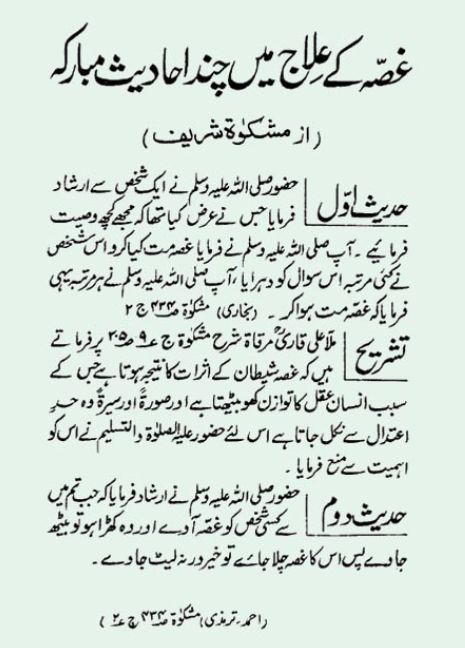
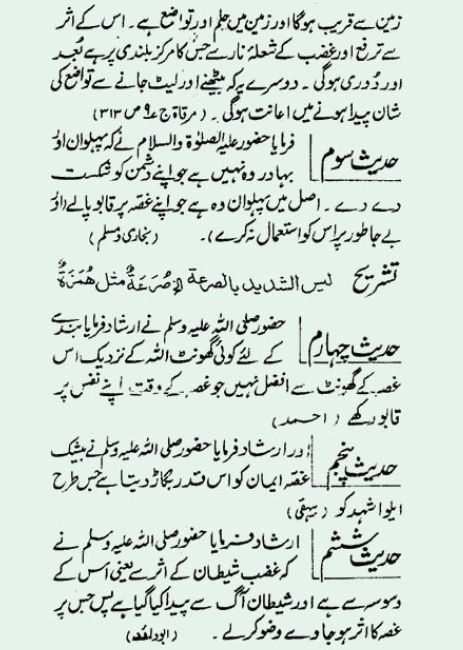
Gusse Ka Ilaj Hadees Ki Roshni Mein
Benefits Of Praying At The Mosque
“I had considered ordering for the prayer to be established, then I would order every man to pray and set loose men who have with them logs of wood upon a people who did not come to the prayer and I would burn their houses with the fire.” (Bukhari, Muslim)
Here are some virtues of praying Salah at the Masjid:
1. Superiority of praying in congregation
He (Sallallahu Alaihi wasallam) also said, “ Prayer in congregation is superior to prayer alone by twenty-seven degrees.” [Bukhari & Muslim, from Ibn Umar (Allah be pleased with him)]
2. A place in Jannah for those who attend the Masjid Morning and evening
Abu Hurairah (radi Allahu anhu) reported: The Prophet (Sallallahu Alaihi wasallam) said, ”He who goes to the mosque in the morning or in the evening, Allah prepares for him a place in Jannah whenever he goes to the mosque in the morning and returns from it in the evening.” [Al-Bukhari and Muslim].
Kasrat e Maal Ki Hirs Ki Muzammat
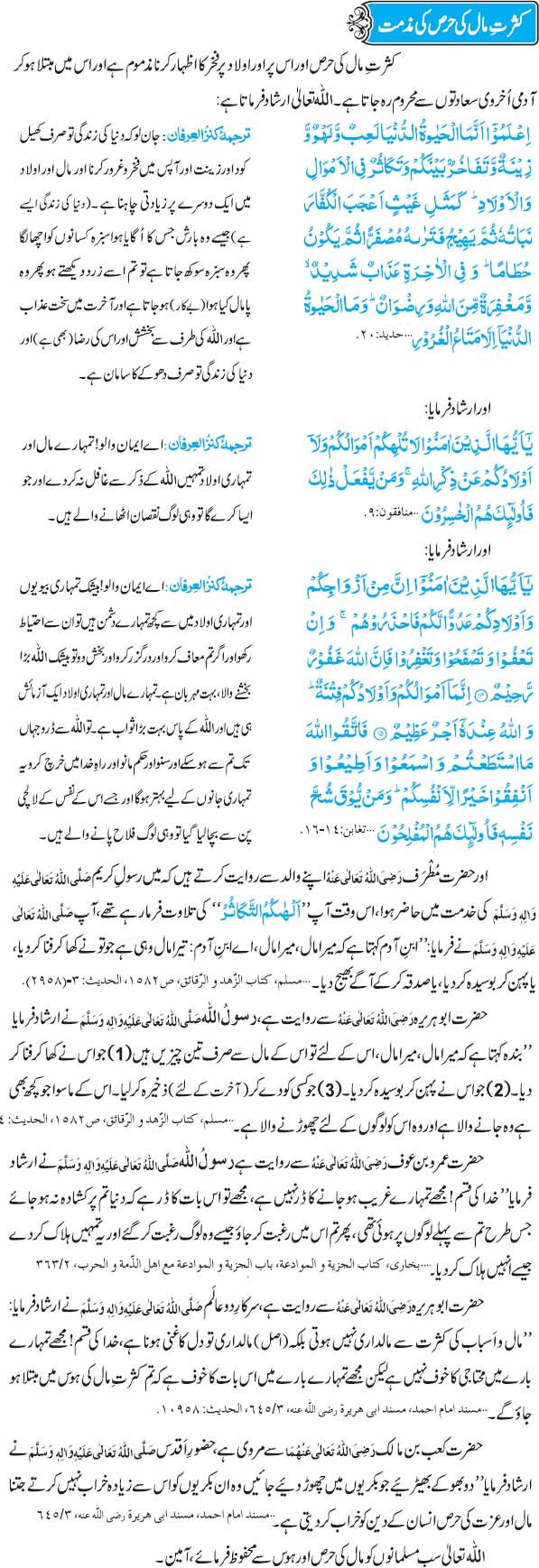
Kasrat e Maal Ki Hirs Ki Muzammat
ALLAH’S Beautiful Name: AL-MUHEE – The Giver Of Life
He gives life and causes to die, and you will be returned to Him. (Surah Yunus, 10:56)
Giving life to all beings, creating them from nothing, and surrounding them with the proper conditions for their survival is a feature unique to Allah, who has infinite power.
Allah makes a sperm unite with an ovum, both of which are invisible to the naked eye. As soon as the sperm destined to fertilize the egg enters the ovum, a membrane covers the egg, and a new life begins. Allah divides this tiny cell first into two and then into four. This process proceeds rapidly, and the result is a miraculous life starting in the mother’s womb. After some time, these cells change in order to form the embryo’s brain, nervous system, bones, and cartilage. This way, within only nine months, Allah creates from nothing a human being who sees, hears, speaks, and uses his or her intelligence. He then grants life. Obviously, an egg and a sperm cannot accomplish this series of miraculous events, for only Allah causes them to unite and then protects the embryo within the mother’s womb for nine months. This is the first creation and the first bringing to life.
Allah grants life to each human being and destines each one to die on a particular day. Until then, He tests them in the life of this world. At the appointed time, He takes their lives and, on the Day of Judgment, resurrects them, just as He first created them from nothing, to repay them for what they did in the world. No doubt, this is easy for Allah, the Almighty. Yet those who ignore this resurrection say:
He makes likenesses of Us and forgets his own creation, saying: “Who will give life to bones when they are decayed?” (Surah Ya Sin, 36:78)
Allah promises that the Resurrection will occur, as the following verses indicate:
Say: “He Who made them in the first place will bring them back to life. He has total knowledge of each created thing.” (Surah Ya Sin, 36:79)
So look at the effect of Allah’s mercy, how He brings the dead earth back to life. Truly, He brings the dead to life. He has power over all things. (Surat ar-Rum, 30:50)
Among His Signs is that you see the earth laid bare, and then, when We send down water on it, it quivers and swells. He who gives it life also gives life to the dead. Certainly, He has power over all things. (Surah Fussilat, 41:39)
Gunnah Aur Bura Khatma: Hazrat Usman Ghani (radi Allahu anhu) Ka Irshad
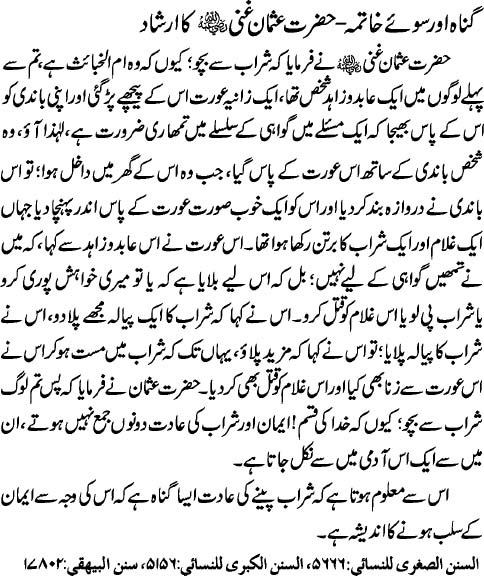
Gunnah Aur Bura Khatma: Hazrat Usman Ghani (radi Allahu anhu) Ka Irshad
The Blessings Of Gratitude And Shukr
Narrated Ibn Abbas (Radi Allahu anhu): The Prophet (SallAllahu alaihi wasallam) said, “You will be gathered (on the Day of Resurrection) and some people will be driven (by the angels) to the left side (and taken to Hell) whereupon I will say as the pious slave [Isa (Jesus)] said:
“Never did I say to them aught except what You (Allah) did command me to say: ‘Worship Allah, my Lord and your Lord.’ And I was a witness over them while I dwelt amongst them, but when You took me up, You were the Watcher over them; and You are a Witness to all things.” “If You punish them, they are Your slaves, and if You forgive them, verily You, only You, are the All-Mighty, the All-Wise.” [Surat Al-Maeda (Table Spread) Ayat – 117:118]
Sahih Al-Bukhari 6:4626
The Blessings of Gratitude and Shukr
Gratitude (shukr) is about expressing thanks and appreciation to those who do any favor to us. Obviously, none can come close to our creator, Allah, who gave us everything. As the Quran states: “Who created you, fashioned you perfectly, and gave you due proportion” [Infitar 82:7]. As humans, Allah has bestowed on us the nature to be grateful, and we should thus express that gratitude not just to Allah but to the people with whom we deal as well. In many places in the Quran, Allah divides people as being grateful and as ungrateful to motivate us to join the camp of those who are grateful. In one of such verses, Prophet Sulaiman said, as stated in the Quran, “. . . then when (Sulaiman (Solomon)) saw it placed before him, he said: ‘This is by the Grace of my Lord to test me whether I am grateful or ungrateful! And whoever is grateful, truly, his gratitude is for (the good of) his own self, and whoever is ungrateful, (he is ungrateful only for the loss of his own self). Certainly! My Lord is Rich (Free of all wants), Bountiful” [An-Naml: 40]

